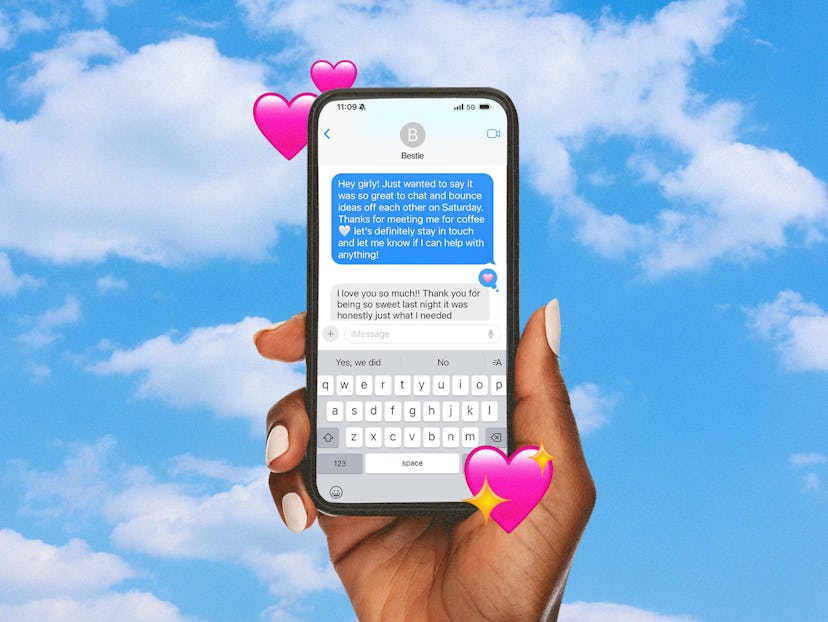Viral
Your Friends Deserve A "Millennial Thank You Note"
A post-hangout text can go a long way, so embrace the cringe.

It’s widely understood that humans have a few basic needs to survive: air, food, and shelter. Beyond that, people need more to feel fulfilled. According to psychologist Abraham Maslow’s hierarchy of needs, this includes love, belonging, creativity, and self-esteem. But according to the Internet? Try a crisp martini on a patio, unpacking the same story from a decade ago, finding out why that couple from your hometown broke off their engagement, or a blurry night out with the company of your closest companions.
Are these needs as integral as oxygen? Of course not. But the texts millennials send after parting ways make it seem as if that quality time is the reason their hearts stay beating. Typically, it includes some variation of “Wow, I needed that ❤️. So grateful for you!!!” and henceforth shall be called the millennial thank you note — not because they’re the only ones sending a post-hang text (they’re not) but because they’re doing it with much more overt earnestness than their Gen Z counterparts.
Exhibit A: “You know when someone texts you right after you get home from hanging out with them and they say like ‘I had a great time, so nice to see you’? What a gift from God,” said @carlabezanson, 31, in a TikTok with more than 850,000 likes.
“They would always have lunch, even when Miranda had a baby. Getting four women together like that is just not that easy!”
Contrast that with Exhibit B: “Me fighting the urge to text my friends ‘thank you for hanging with me today it was so much fun :D you’re literally the reason i’m gonna see the sunrise tomorrow’ everytime we finish hanging out,” @thatssorav3n_, a college student, wrote in a TikTok with 573,000 likes.
See the difference in tone? Younger folks tend to have a more sarcastic way of validating their pals. But why?
“I feel like it’s a very Gen Z thing, earnestness through irony,” says Andrew Pattenaude, 27, who frequently sends his group chat a meme after hanging out with them — specifically the one that says Drake’s the type of guy to look around at his friends and be like “I needed this.”
Eventually, this became his go-to way of letting people know he enjoyed their time together without getting too corny. “It’s like a layer of protection to say something that you genuinely feel,” he says.
Gen Z, those now between 13 and 28 years old, are digital natives, so texting has always been baked into their lives. “[Gen Z] is more used to that constant, more casual contact, especially after COVID,” says Kathryn Lee, LMHC, Ed.M., M.A. “Millennials would probably prefer more of that face-to-face connection, because that is what they grew up with, that is more coded into their systems.” So when they get that IRL quality time, they’re sure to say thank you.
Morgan Sullivan, 26, is deeply aligned with her generation. “Even just how I contour my face, I’m like, ‘This is how Alix Earle does it,’” she says. So after getting dinner with her girls, she’ll usually send something like, “Need to queen out like that again soon.”
The contrast in tone can also be attributed to their life stage. In college — and to a lesser degree, their 20s — plenty of people see their crew multiple times a week, and text with the knowledge that they’ll be together again soon. They live nearby and have time to make plans, like Pattenaude’s weekly White Lotus watch parties.
But for many millennials, now between 29 and 44, friendship is inconvenient. They might have moved away, and are more likely to have responsibilities like marriage, kids, and work take precedence.
Daniela Garrido, 29, is right on the cusp but feels more connected to the older generation. “As I get older, the more I realize that having friendships is so necessary but so hard,” she says, noting how pop culture staples like Sex and the City gave her false expectations about adult social circles. “They would always have lunch, even when Miranda had a baby. Getting four women together like that is just not that easy!”
And because Garrido knows how hard it is to make plans, she’s intentional about sending a sincere millennial thank you note afterward. “I fall into sending ‘I want to do that again,’ because I want to reassure them that it was fun and fulfilling for me, and I hope that it was for them too,” she says. “When people make the effort [to see me], I know it’s a big deal.”
No, really, it’s a big deal. “Friendship is a relationship, and it takes a lot of effort and time,” says Lee. “But a lot of millennials who are in these transitional phases feel really lonely.” Texts like Garrido’s could show your pals that the effort and time were worth the potential inconvenience.
In fact, according to Lee, the millennial thank you note’s earnestness is the best way to nurture your relationships, since the intention can get lost when using Gen Z’s specific flavor of sarcasm, Internet slang, and memes.
“You don’t need to be super gushy-mushy,” she says. “It can just start with ‘Hey, that was a lot of fun,’ or even sending some pictures you took and saying ‘Oh, my gosh. You look so cute.’”
Perhaps Gen Z should embrace that cringe, earnestness be damned, and shamelessly send a millennial thank you note after their next yap session. Because, after all, they too probably needed that. ❤️